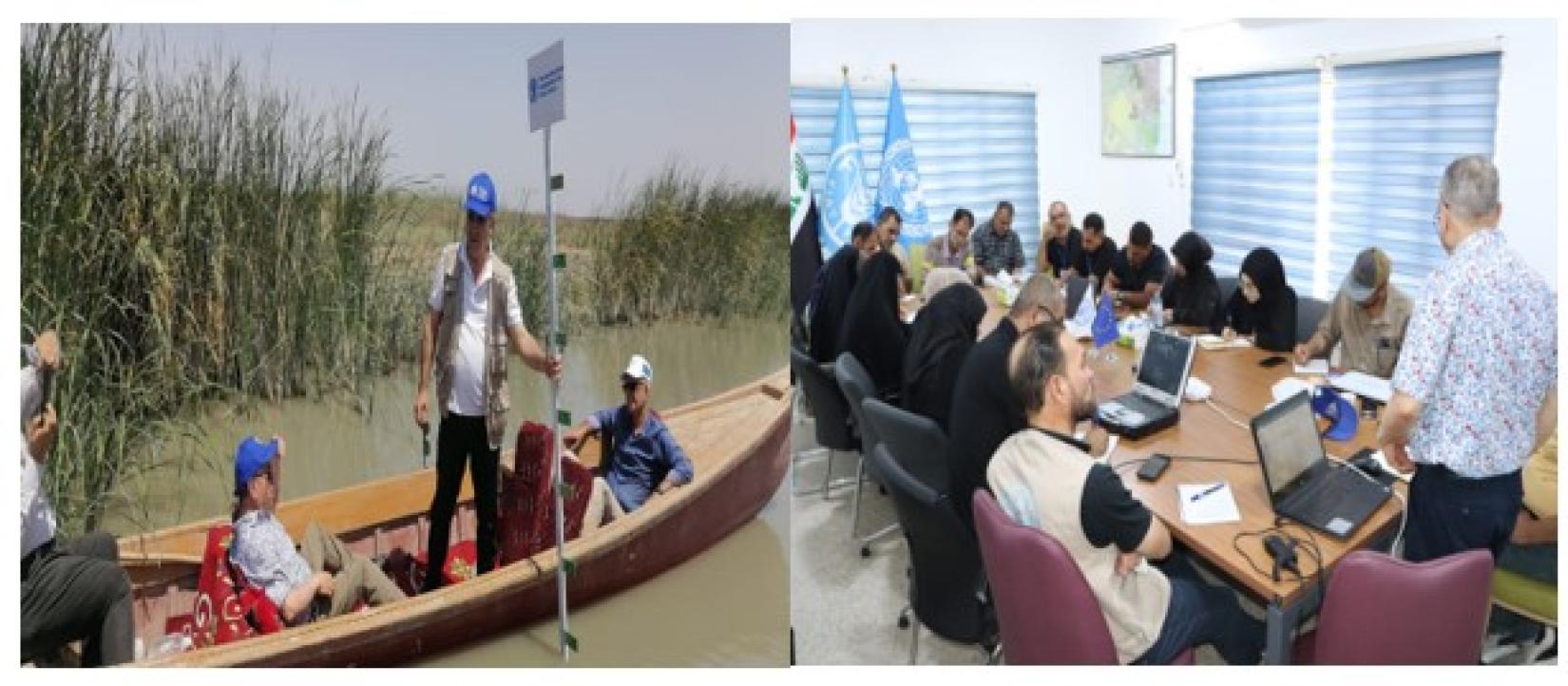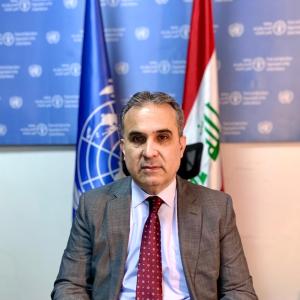FAO Iraq Develops Emergency Plan to Support Buffalo Producers Hit by the Current Severe Crisis of Water Scarcity in the Marshes-southern Iraq
25 July 2023
Following FAO Iraq's call to action published on July 10, 2023, the organization took swift action by mobilizing its dedicated Extension officers. An emergency workshop was conducted in Basra on the 19th and 20th of July 2023. The workshop aimed to address the impact of the environmental disaster that befell the marsh areas, to put an urgent action plan for strengthening buffalo producers' capacities and escape from the quagmire of death that threatens their buffaloes.

The workshop was attended by large number of MOA Extension Officers from all the districts of the governorates affected by water scarcity crisis in Marshes in Basra, Thi-Qar and Missan Governorates in addition to FAO team. The workshop is commissioned by FAO Representative in Iraq, Dr. Salah ElHajj Hassan following an emergency visit to these areas with the FAO team to assess the critical situation in light of the high temperatures and the scarcity of water in the marshes.
During this workshop, Dr. Chedly Kayouli, Senior Livestock Expert, FAO Iraq has highlighted the very critical situation and urged the field Network teams in the Southern Marshes, taking the initiatives and exert maximum efforts to contribute, even modestly, to saving the Southern marshes from the most serious crisis of its kind in this century, which may destroy life in all its environmental aspects.
The workshop resulted in the concrete implementation of immediate and medium-term actions with rapid results, by pooling the commendable efforts of all the projects currently implemented by FAO in these areas.
The key outcomes are:
- Discussing and preparing for the urgent interventions to be undertaken and the necessary logistical support required for the distribution of equipment and supplies as well as capacity
- Updating the criteria for the selection of lists of 3.000 beneficiaries in the most affected areas of the marshes to be considered for emergency assistance.
- Rapid support to 3.000 buffalo producers with the new feed inputs locally produced and already proven to be successful in the Iraqi Marshes.
- Providing support to 500 HHs (Buffalo producers), mostly affected by water scarcity and high salinity living inside the marshes, with 300 water tanks of different capacities to transport and store water.
- Expanding on the implementation of the Climate-Smart crop production and Environmentally sustainable practices.
- Supplying dairy equipment and training to 3.000 producers, including 2.000 Women-Headed Households, to improve milk handling, cooling, and processing of traditional dairy products. This intervention, supported by the EU-funded project (004/EC) for improving dairy processing.
Dr Salah El Hajj Hassan, FAO Representative in Iraq, also highlighted the urgent need for sustainable solutions to support marsh dwellers, particularly buffalo farmers. These include providing locally produced feed for improving the value chain for buffalo production. These efforts aim to alleviate suffering, improve incomes and build community resilience.
FAO Iraq’s emergency plan aligns with multiple SDGs, reflecting the organization’s commitment to addressing urgent environmental challenges, supporting vulnerable communities, and promoting sustainable development in the region.


He started his career in 1984, as Senior Research Assistant in the Agricultural Research and Education Centre (AREC), American University of Beirut. From 1987 to 1991, he was Coordinator of the Student Training Programme, and also Agriculture and Horticultural Teacher for the Faculty of Agriculture, at the Lebanese University.
From 1991 to 1995, he worked as Agricultural Engineer at the Ministry of Agriculture, Bekaa Regional Office, Zahlah and was then assigned to the Agricultural Research Institute in the Tal Amara station, first as Head of the Crop Production Department and subsequently in charge of the Plant Protection Laboratory. From 2002 to 2006, he was Director of the Kfardane Research Station (Agricultural Research Institute). In 2008, he became Visiting Scientist at the International Maize and Wheat Improvement Centre (CIMMYT) and Coordinator of a project with the International Centre for Atomic Energy Agency, Vienna.
In 2010, he served as Advisor to the Minister for Agriculture of Lebanon. In 2011, he became President of the Pesticide Scientific Committee, Head of the Phytoplasma Committee and Director of the Agriculture and Rural Development Programme (ARDP) (EU-funded project). From 2010 to 2013, he represented Lebanon in negotiations with EU, Egypt, Jordan and Iraq. During his career, Mr Hajj Hassan also carried out a number of other functions. He represented the Lebanese Agricultural Research Institute (LARI) in several research programmes with the International Centre for Agricultural Research in the Dry Areas (ICARDA) and the American University of Beirut. He was Coordinator of the Mashreq/Maghreb project with ICARDA, representing Lebanon in the Steering Committee, as well as being the Head of the Sugar-beet Delivery and of the Wheat Delivery Committees. For a number of years, Mr Hajj Hassan worked for the preparation of FAO TCP projects and served as the National Director of a TCP project. He joined FAO in January 2014 as FAO Representative in Yemen. Mr Hajj Hassan succeeds Mr El Zubi as FAO Representative in Iraq.






